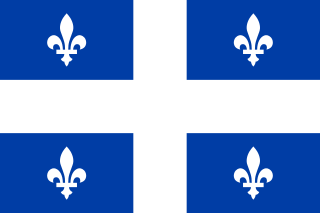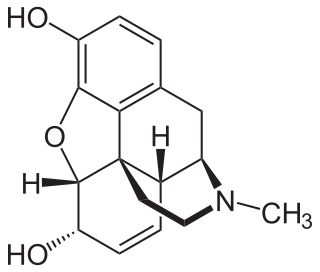The Parti du socialisme chrétien (PSC) (known in English as the Christian Socialist Party) was a fringe political party in the Canadian province of Quebec. It fielded 103 candidates in the 1985 Quebec general election.

Canada is a country in the northern part of North America. Its ten provinces and three territories extend from the Atlantic to the Pacific and northward into the Arctic Ocean, covering 9.98 million square kilometres, making it the world's second-largest country by total area. Canada's southern border with the United States, stretching some 8,891 kilometres (5,525 mi), is the world's longest bi-national land border. Its capital is Ottawa, and its three largest metropolitan areas are Toronto, Montreal, and Vancouver. As a whole, Canada is sparsely populated, the majority of its land area being dominated by forest and tundra. Consequently, its population is highly urbanized, with over 80 percent of its inhabitants concentrated in large and medium-sized cities, with 70% of citizens residing within 100 kilometres (62 mi) of the southern border. Canada's climate varies widely across its vast area, ranging from arctic weather in the north, to hot summers in the southern regions, with four distinct seasons.

Quebec is one of the thirteen provinces and territories of Canada. It is bordered to the west by the province of Ontario and the bodies of water James Bay and Hudson Bay; to the north by Hudson Strait and Ungava Bay; to the east by the Gulf of Saint Lawrence and the province of Newfoundland and Labrador; and to the south by the province of New Brunswick and the U.S. states of Maine, New Hampshire, Vermont, and New York. It also shares maritime borders with Nunavut, Prince Edward Island, and Nova Scotia. Quebec is Canada's largest province by area and its second-largest administrative division; only the territory of Nunavut is larger. It is historically and politically considered to be part of Central Canada.
Despite its name, the PSC had no connection with Canada's social democratic political tradition. It was established by Jacques Paquette, a former heroin addict who operated drug treatment centres throughout Quebec in the 1980s. The party was primarily focused on drug issues, supporting the legalization of cannabis and the death penalty for traffickers in hard drugs. [1]

Opioid use disorder is a problematic pattern of opioid use that causes significant impairment or distress. Symptoms of the disorder include a strong desire to use opioids, increased tolerance to opioids, failure to fulfill obligations, trouble reducing use, and withdrawal syndrome with discontinuation. Opioid withdrawal symptoms may include nausea, muscle aches, diarrhea, trouble sleeping, or a low mood. Addiction and dependence are components of a substance use disorder. Complications may include opioid overdose, suicide, HIV/AIDS, hepatitis C, marriage problems, or unemployment.
Drug rehabilitation is the process of medical or psychotherapeutic treatment for dependency on psychoactive substances such as alcohol, prescription drugs, and street drugs such as marijuana, cocaine, heroin or amphetamines. The general intent is to enable the patient to confront substance dependence, if present, and cease substance abuse to avoid the psychological, legal, financial, social, and physical consequences that can be caused, especially by extreme abuse.

Cannabis, also known as marijuana among other names, is a psychoactive drug from the Cannabis plant used for medical or recreational purposes. The main psychoactive part of cannabis is tetrahydrocannabinol (THC), one of 483 known compounds in the plant, including at least 65 other cannabinoids. Cannabis can be used by smoking, vaporizing, within food, or as an extract.
On one occasion, Paquette said that he would establish a leftist dictatorship in a "free Quebec" to remove heroin dealers from the province. [2] He also promoted the use of handguns by citizen vigilantes to fight organized crime. [3]

A handgun is a short-barrelled firearm that can be held and used with one hand. The two most common handgun sub-types in use today are revolvers and semi-automatic pistols.

Organized crime is a category of transnational, national, or local groupings of highly centralized enterprises run by criminals who intend to engage in illegal activity, most commonly for profit. Some criminal organizations, such as terrorist groups, are politically motivated. Sometimes criminal organizations force people to do business with them, such as when a gang extorts money from shopkeepers for "protection". Gangs may become disciplined enough to be considered organized. A criminal organization or gang can also be referred to as a mafia, mob, or crime syndicate; the network, subculture and community of criminals may be referred to as the underworld. European sociologists define the mafia as a type of organized crime group that specializes in the supply of extra-legal protection and quasi law enforcement. Gambetta's classic work on the Sicilian Mafia generates an economic study of the mafia, which exerts great influence on studies of the Russian Mafia, the Chinese Mafia, Hong Kong Triads and the Japanese Yakuza.
Paquette ran in the 1985 election in Hull under the name "Jacob Easter", which was intended as a humorous translation of his real name. [4] He placed last in a field of six candidates.
Hull is provincial electoral riding located in the Outaouais region of Quebec, Canada. It includes the entire Hull sector of the city of Gatineau, as well as some additional territory.
Paquette was killed in a car crash near Riviere-du-Loup, Quebec, on August 28, 1986. [5] The party appears to have become inactive after his death.